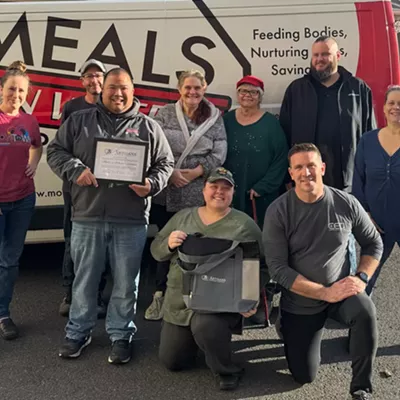Family Home Care and Hospice makes house calls. A lot of them. They provide at-home health care services for patients in an almost 100-mile radius throughout Spokane and Whitman counties. Just driving from place to place, the employees rack up more than a million miles a year of car time.
Many of those miles are driven by nurse Lisa Haglund. She visits patients everywhere from Colbert to Deer Park to the back roads of Stevens and Pend Oreille counties, driving her Nissan Quest Minivan.
“There’s some people who really live in some really podunk areas,” Haglund says.
With Quest Minivans only getting 18 miles per gallon in the city, and 25 mpg on the highway, all that driving began to get costly. But as gas prices continued to tick up, a surprising hero came to her rescue: Her employer.
Concerned about the environmental impact of the million miles his employees were driving in gas-devouring clunkers, Family Home Care president Mike Nowling partnered with Enterprise Rent-a-Car to lease a fleet of 18 to 20 Nissan Rogue crossovers. All Haglund had to do was to pay $250 a month, and she’d get a Nissan Rogue crossover, and not have to pay a dime for gas or insurance.
The really cool thing? As long as she’s not taking regular road trips to Seattle, she’s allowed to use it for personal use.
“I like the vehicle. My teenage son especially likes the vehicle,” Haglund says. “I like the idea that it’s more environmental, especially in this day and age where everybody’s trying to go green. Cost-efficiency-wise it’s certainly to our advantage to go with the leased car.”
For Nowling, it’s a win-win-win decision. Nowling believes that he might save a little money — or at least not lose any.
“It’s going to be very close to a break-even,” Nowling says. While he’s paying for gas and insurance for 18 drivers, he no longer has to pay them a stipend per mile. If gas reached $4.50 per gallon — which it was flirting with this past summer — they estimate they’d save $12,000 a year on fuel costs.
The people who really save money, Nowling says, are his employees. And with a nursing shortage putting pressure on health care, an offer to toss in a car, free gas and free insurance for only $250 a month makes for a mighty persuasive recruiting tool.
“One woman was spending $700 a month on gas,” Nowling says. “For a third of that she’s getting a car.”
In the end, however, a lot of the rationale goes back to the environment. The Nissan Rogues provided are SUVs — large vehicles are necessary to carry the medical equipment. But for a big vehicle, it gets fairly generous gas mileage. Nissan estimates the Rogue gets about 22 mpg in the city, and 27 mpg on the highway. With 300,000 miles a year being driven in the Rogues, Nowling hopes all those fewer puffs of exhaust can make a small — but important — impact on the environment.
But Nowling’s commitment to the environment runs deeper than good gas mileage. Through Enterprise, he’s purchased carbon offsets. Enterprise is matching 25 percent of the offset cost, up to $600 per year per vehicle.
Carbon offsets — where a company or person pays money to a company that does something to “offset” their environmental impact, such as planting a tree — have been a fairly controversial solution offered for the global warming crisis. Enterprise works with Terrapass, a San Francisco company that uses the carbon offset money to build windmills, capture emissions from landfills, and generate electricity with methane from cow manure.
It’s not a perfect solution. Some, like writer George Monbiot of London’s Guardian newspaper, complain that carbon offsets are really no different from church indulgences of the 15th century — they alleviate the guilt but do nothing about fixing the “sin.” Nowling says he’s aware of the controversy, but offsets are the best solution Family Home Care has for now.
“These miles are going to be driven one way or another,” Nowling says. “I’ll do anything I can do to offset the impact of these miles.”





















